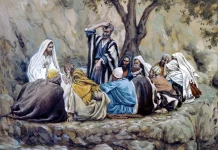Wine plays a significant role in the Bible, with more than 140 references to this delicious fruit of the vine. From the days of Noah in Genesis (Genesis 9:18–27) to the time of Solomon (Song of Solomon 7:9) and on through the New Testament to the book of Revelation (Revelation 14:10), wine appears in the biblical text.
A standard drink in the ancient world, wine was one of God’s special blessings to bring joy to His people’s hearts (Deuteronomy 7:13; Jeremiah 48:33; Psalm 104:14–15). Yet the Bible makes it clear that overindulgence and abuse of wine are dangerous practices that can ruin one’s life (Proverbs 20:1; 21:17).
Wine in the Bible
- Wine, which gladdens the heart, is one of God’s special blessings to His people.
- Wine in the Bible symbolizes life, vitality, joy, blessing, and prosperity.
- In the New Testament, wine represents the blood of Jesus Christ.
- The Bible is clear that consuming wine in excess can do great harm to those who misuse it in this way.
Wine comes from the fermented juice of grapes—a fruit grown widely throughout the ancient holy lands. In Bible times, ripened grapes were gathered from vineyards in baskets and brought to the winepress. The grapes were crushed or treaded on a large flat rock so that the juice pressed out and flowed down through shallow canals into a giant stone vat at the foot of the winepress.
The grape juice was collected into jars and set aside to ferment in a cool, natural cave or hewn cistern where the appropriate fermentation temperature could be retained. Many passages indicate that the color of wine in the Bible was red like blood (Isaiah 63:2; Proverbs 23:31).
Wine in the Old Testament
Wine symbolized life and vitality. It was also a sign of joy, blessing, and prosperity in the Old Testament (Genesis 27:28). Called “strong drink” thirteen times in the Old Testament, wine was a potent alcoholic beverage and aphrodisiac. Other names for wine in the Bible are “the blood of grapes” (Genesis 49:11); “wine of Hebron” (Ezekiel 27:18); “new wine” (Luke 5:38); “aged wine” (Isaiah 25:6); “spiced wine;” and “pomegranate wine” (Song of Solomon 8:2).
Throughout the Old Testament, partaking of wine was associated with happiness and celebration (Judges 9:13; Isaiah 24:11; Zechariah 10:7; Psalm 104:15; Ecclesiastes 9:7; 10:19). The Israelites were commanded to make drink offerings of wine and tithes of wine (Numbers 15:5; Nehemiah 13:12).
Wine featured prominently in several Old Testament stories. In Genesis 9:18–27, Noah planted a vineyard after leaving the ark with his family. He became drunk on wine and lay uncovered in his tent. Noah’s son Ham saw him naked and disrespected his father to his brothers. When Noah found out, he cursed Ham and his descendants. This occasion was the first incident in the Bible showing the devastation that drunkenness can cause to oneself and one’s family.
In Proverbs 20:1, wine is personified: “Wine is a mocker, strong drink a brawler, and whoever is led astray by it is not wise” (Proverbs 20:1, ESV). “Those who love pleasure become poor; those who love wine and luxury will never be rich,” informs Proverbs 21:17 (NLT).
Even though wine was God’s gift to bless His people with joy, its misuse led them to abandon the Lord to worship idols (Hosea 2:8; 7:14; Daniel 5:4). God’s wrath is also pictured as a cup of wine poured out in judgment (Psalm 75:8).
In Song of Solomon, wine is the drink of lovers. “May your kisses be as exciting as the best wine,” declares Solomon in verse 7:9 (NLT). Song of Solomon 5:1 lists wine among the ingredients of love-making between lovers: “[Young Man] I have entered my garden, my treasure, my bride! I gather myrrh with my spices and eat honeycomb with my honey. I drink wine with my milk. [Young Women of Jerusalem] Oh, lover and beloved, eat and drink! Yes, drink deeply of your love!” (NLT). In various passages, the love between the two is described as better and more praiseworthy than wine (Song of Solomon 1:2, 4; 4:10).
In ancient times, wine was consumed undiluted, and wine mixed with water was considered spoiled or ruined (Isaiah 1:22).
Wine in the New Testament
In the New Testament, wine was stored in flasks made from animal skins. Jesus applied the concept of old and new wineskins to illustrate the difference between the old and new covenants (Matthew 9:14–17; Mark 2:18–22; Luke 5:33–39).
When wine ferments, it produces gasses that stretch the wineskins. New leather can expand, but older leather loses its flexibility. New wine in old wineskins would crack the leather, causing the wine to spill out. The truth of Jesus as Savior could not be contained within the former confines of self-righteous, pharisaical religion. The old, dead way was too dried up and unresponsive to carry the fresh message of salvation in Jesus Christ to the world. God would use His church to accomplish the goal.
In Jesus’ life, wine served to demonstrate His glory, as seen in Christ’s first miracle of turning water into wine at the wedding in Cana (John 2:1–12). This miracle also signaled that Israel’s Messiah would bring joy and blessing to His people.
According to some Bible scholars, the wine of the New Testament was diluted with water, which may have been accurate in specific uses. But wine had to have been strong enough to intoxicate for the apostle Paul to warn, “Do not get drunk on wine, which leads to debauchery. Instead, be filled with the Spirit” (Ephesians 5:1, NIV).
Sometimes wine was mixed with spices like myrrh as an anesthetic (Mark 15:23). Drinking wine was also recommended to relieve the wounded or sick (Proverbs 31:6; Matthew 27:34). The apostle Paul instructed his young protégé, Timothy, “Don’t drink only water. You ought to drink a little wine for the sake of your stomach because you are sick so often” (1 Timothy 5:23, NLT).
Wine and the Last Supper
When Jesus Christ commemorated the Last Supper with His disciples, He used wine to represent His blood which would be poured out in sacrifice for the sins of the world through His suffering and death on the cross (Matthew 26:27–28; Mark 14:23–24; Luke 22:20). Everyone who remembers His death and looks forward to His return partakes in the new covenant confirmed with His blood (1 Corinthians 11:25). When Jesus Christ comes again, they will join Him in a great celebratory feast (Mark 14:25; Matthew 26:29; Luke 22:28–30; 1 Corinthians 11:26).
Today, the Christian Church continues to celebrate the Lord’s Supper as He commanded. In many traditions, including the Catholic Church, fermented wine is used in the sacrament. Most Protestant denominations now serve grape juice. (Nothing in the Bible commands or forbids using fermented wine in Communion.)
Differing theological views exist regarding the elements of bread and wine in Communion. The “real presence” view believes that Jesus Christ’s body and blood are physically present in the bread and wine during the Lord’s Supper. The Roman Catholic position holds that once the priest has blessed and consecrated the wine and the bread, the body and blood of Christ become literally present. The wine transforms into Jesus’ blood, and the bread becomes His body. This change process is known as transubstantiation. A slightly different view believes Jesus is genuinely present, but not physically.
Another view is that Jesus is present in a spiritual sense, but not literally in the elements. Reformed churches of the Calvinist view take this position. Finally, the “memorial” view accepts that the elements do not change into the body and blood but instead function as symbols, representing Christ’s body and blood, in memory of the Lord’s enduring sacrifice. Christians who hold this position believe Jesus was speaking in figurative language at the Last Supper to teach spiritual truth. Drinking His blood is a symbolic action that represents receiving Christ wholly into one’s life and not holding anything back.
Wine factors richly throughout the biblical narrative. Its value is identified in agricultural and economic industries as well as in bringing gladness to people’s hearts. Simultaneously, the Bible warns against excessive drinking of wine and even advocates for total abstinence in some situations (Leviticus 10:9; Judges 13:2–7; Luke 1:11–17; Luke 7:33).
Sources
- Wine. The Lexham Bible Dictionary.
- Wine. Holman Treasury of Key Bible Words (p. 207).
- Wine, Wine Press. The International Standard Bible Encyclopaedia (Vols. 1–5, p. 3087).
- Wine, Wine Press. Dictionary of Bible Themes: The Accessible and Comprehensive Tool for Topical Studies




